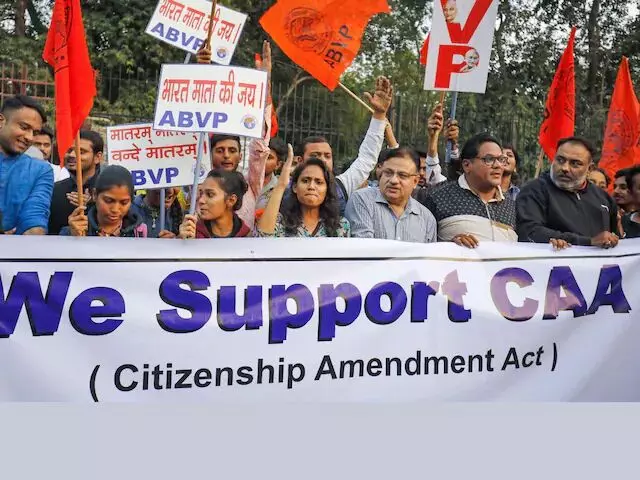CAA: Apex court to hear pleas for stay on Citizenship Amendment Rules on Mar 19

New Delhi: The Supreme Court on Friday agreed to hear pleas on March 19 regarding a direction to the Centre to suspend the implementation of the Citizenship Amendment Rules, 2024.
A bench comprising Chief Justice D Y Chandrachud and Justices JB Pardiwala and Manoj Misra acknowledged the submissions made by senior advocate Kapil Sibal, representing the Indian Union Muslim League (IUML). Sibal said that once Indian citizenship is granted to migrant Hindus, it cannot be revoked, warranting an early hearing.
Solicitor General Tushar Mehta, representing the Centre, questioned the standing of the petitioners. He argued that no petitioner has the right to challenge the grant of citizenship. Mehta pointed out that there are 237 pending petitions against the CAA, with four interim applications seeking a stay on the rules.
Chief Justice Chandrachud announced that the court would hear the matter on Tuesday, considering the numerous cases involved. The IUML, a Kerala-based political party, along with three other petitioners, filed the interim pleas after the Centre implemented the Citizenship (Amendment) Act, 2019, by notifying the rules—four years after the contentious law was passed by Parliament.
The IUML’s application seeks the court’s direction to prevent coercive action against members of the Muslim community during the adjudication of the writ petitions. Notably, Muslims are ineligible to apply for Indian citizenship under the CAA.
The IUML further urged the apex court to provisionally allow Muslim community members to apply for citizenship and submit a report on their entitlement. Additionally, the Democratic Youth Federation of India has also moved the court seeking a stay on the rules.
The IUML contends that the “continued operation of the impugned provisions of the Citizenship Amendment Act, 2019, and Citizenship Amendment Rules 2024” would create a situation where valuable rights are granted only to individuals of specific religions. This, they argue, undermines the principle of secularism—the bedrock of India’s Constitution.
With the unveiling of the rules on March 11, days ahead of the announcement of the Lok Sabha elections, the Modi government kicked off the process of granting Indian citizenship to persecuted non-Muslim migrants — Hindus, Sikhs, Jains, Buddhists, Parsis and Christians — from Pakistan, Afghanistan and Bangladesh.
The rules came into force with immediate effect, according to a gazette notification.
The contentious CAA had sparked protests in various parts of the country in late 2019 and early 2020 over alleged discriminatory provisions.
While refusing to stay the operation of the law, the top court had on December 18, 2019 issued notices to the Centre on the pleas.




